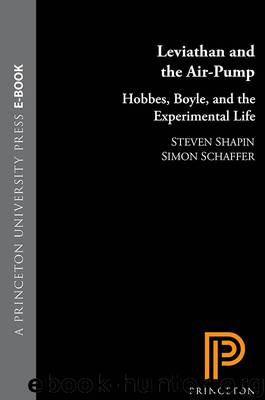Leviathan and the Air-Pump by Shapin Steven; Schaffer Simon; & Simon Schaffer

Author:Shapin, Steven; Schaffer, Simon; & Simon Schaffer
Language: eng
Format: epub
Publisher: Princeton University Press
Published: 2011-02-15T16:00:00+00:00
THE CONSTITUTION OF THE AIR
That the proper “way of discoursing” in natural philosophy was a moral matter is easily seen. Moral considerations also informed Boyle’s conceptual and technical defence of the integrity of his pump. The moral threat posed by Hobbes to the community of natural philosophers consisted, on the one hand, of his violations of the rules and conventions of experimental discourse: his “dogmatic” way threatened to sow seeds of divisiveness in the garden of experimental harmony. But the particular nature of his criticisms also sinned against the boundary conditions laid down by experimental philosophers. By violating the boundaries between “physiology” and “metaphysics,” between “matters of fact” and causal items, Hobbes threatened to destroy the classifications that permitted amicable discourse and that generated uncoerced assent. Nowhere are these interconnections between the conceptual, the technical, and the moral more visible than in Boyle’s treatment of the constitution of the air, as this related to specific experimental performances and Hobbes’s criticisms thereof. Hobbes had to be put right on two heads: first, he had attacked Boyle as a vacuist when Boyle had declared no position on this “metaphysical” matter;60 second, he had deployed notions of the constitution of the air which were themselves either “metaphysical” or manifestly erroneous.61 In either case, Hobbes’s claims about the make-up of the air were specifically addressed to that most important issue: the physical integrity of the air-pump and the legitimacy of its findings. Boyle’s treatment of these criticisms took both a programmatic and an experimental form.
Hobbes had argued that Boyle’s machine produced no vacuum. We have already given an account of the technical response that Boyle made: he had designed a modified version of the air-pump that was arguably less likely to leak with respect to atmospheric air.62 However, Boyle recognized that a decisive defence against Hobbes would involve him in a more explicit discussion of the constitution of the air than he had previously provided. There are two points to be made in this connection: first, that Boyle’s treatment of the air’s constitution in those texts was always addressed to the specific question of the physical integrity of the air-pump and the manner in which Hobbes had impugned that integrity; second, that Boyle offered a variety of versions of Hobbes’s claims about the constitution of the air. The refutation of each of these versions allowed Boyle to defend the pump and the legitimacy of its experimental products in different and in equally important ways.
Boyle said that Hobbes had been “unclear” in his statements about the constitution of the air. But Hobbes’s fundamental contention in the Dialogus physicus had been this: the atmosphere consisted of a mixture of terrestrial particles, which possessed a “congenital” simple circular motion, and of a pure air (aer purus), sometimes compared with an “aethereal body.” The former fraction mechanically performed the functions which Boyle attributed to spring; the latter fraction filled the space in the receiver at all times. The subtler and purer fractions of air were still air, and so the receiver could never legitimately be said to be empty.
Download
This site does not store any files on its server. We only index and link to content provided by other sites. Please contact the content providers to delete copyright contents if any and email us, we'll remove relevant links or contents immediately.
Enlightenment Now: The Case for Reason, Science, Humanism, and Progress by Steven Pinker(6891)
A Journey Through Charms and Defence Against the Dark Arts (Harry Potter: A Journey Through…) by Pottermore Publishing(4732)
The Immortal Life of Henrietta Lacks by Rebecca Skloot(4275)
A Journey Through Divination and Astronomy by Publishing Pottermore(4260)
Elon Musk by Ashlee Vance(3872)
Origin Story: A Big History of Everything by David Christian(3492)
COSMOS by Carl Sagan(3374)
Alchemy and Alchemists by C. J. S. Thompson(3313)
Enlightenment Now by Steven Pinker(3282)
Shadow of Night by Deborah Harkness(3189)
Inferior by Angela Saini(3157)
Bad Pharma by Ben Goldacre(3118)
A Mind For Numbers: How to Excel at Math and Science (Even If You Flunked Algebra) by Barbara Oakley(3116)
Origin Story by David Christian(3013)
Signature in the Cell: DNA and the Evidence for Intelligent Design by Stephen C. Meyer(2895)
The Code Book by Simon Singh(2884)
The Elements by Theodore Gray(2861)
A Brief History of Time by Stephen Hawking(2834)
A Journey Through Potions and Herbology (A Journey Through…) by Pottermore Publishing(2778)
